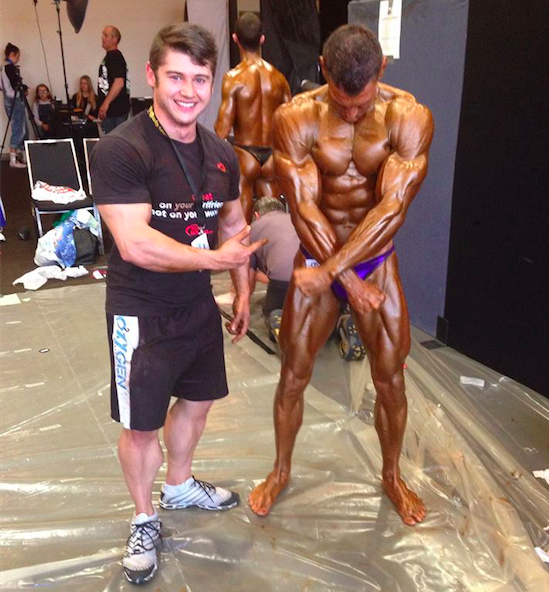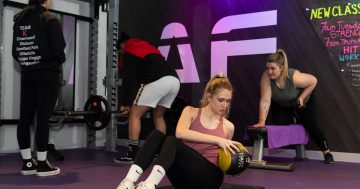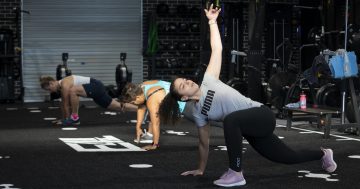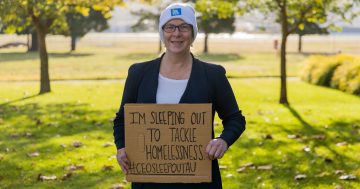
23-year-old Kyle Webber (pictured above, left) has had an almost lifelong fascination with nutrition. So when two friends asked him to help them prepare for an upcoming bodybuilding competition in early 2014, he jumped at the opportunity. Both friends placed first in their respective divisions.
A little over 18 months later, Kyle’s online nutrition coaching business, Nutrivolve, has grown from 2 to 230 clients in countries including Australia, the United Kingdom and the United States. And though not all clients aspire to win bodybuilding events, Kyle’s bodybuilding clients took home 24 first-place finishes in competitions across Australia in Nutrivolve’s first year alone.
“I want to be honest with people and make sure the results speak for themselves,” he says of Nutrivolve’s rapid growth.
“When people fail on their diets, they often read online or on social media that this means they’re weak. No one really teaches you that it’s normal to have setbacks, and that if you have a supportive community around you then it’s easy to get back on track. We’ve built up an active and supportive community, and we’ve found that people really want to be a part of that.”
Kyle’s interest in nutrition began at an early age.
“I was a fat kid going through school who was always kind of fit, but I never had the body to show for it. I didn’t want to be big or lean, but I did want to lose weight,” he explains.
“In high school I didn’t care about any subject that didn’t have to do with nutrition. I was fascinated by how changing what you eat could affect your body.”
After finishing school, Kyle completed an advanced diploma in nutritional medicine, with a view to eventually helping individuals make better food choices.
“I didn’t like that there were so many opinions about diet and what to eat, both online and when I spoke to people. There are so many different factors when it comes to nutrition, and I wanted people to see that there’s no single approach that will work best for everyone.
“I really wanted to teach people are a basic understanding of what they’re eating and how to listen to what their bodies are saying. Jumping from fad to fad isn’t going to work,” he says.
And while Kyle’s expertise is in high demand, both in Canberra and overseas, he isn’t willing to work with just anyone.
“Every client has to complete an application form. We need to know that we can work with that particular individual, and sometimes you just don’t click. We need as much info about a client’s goals, what they’d like to achieve and what they’d like to eat so that be can get the best results with a diet you can stick to,” he says.
He says that one of the key lessons he’s learned since starting Nutrivolve is the importance of giving back to clients, mentors and the general community. He’s also working on streamlining the business, presenting seminars on common challenges people face when dieting (the next one is in a couple of weeks on 16 August) and developing new coaches to assist with client training.
“The best thing I’ve learned in business and personally is that the more you can give to people, the further you can set yourself apart from your competition. I believe you can never do too much. Sure, I’ve burnt myself out many times, but it’s pushed my boundaries and helped me see what I’m capable of achieving.
“We’re a small business, so having a large client base does get overwhelming at some. Sometimes we do bite off a bit more than we can chew, and then spend 16 hours a day responding to emails, which isn’t sustainable.
“We’re looking at new ways of getting as much information to a broad range of people without me necessarily working one-on-one with clients. I’m also training coaches to help clients, and there are two coaches working underneath me while we get all of that set up.”
Kyle’s advice to people looking to improve their health and wellbeing through diet is to understand that results don’t happen overnight. (This is something I have to remind myself of every time a six-pack doesn’t magically appear when I eat salad and tuna for lunch.)
“It’s important not to focus so much on stressing about whether you’re achieving your goals or not. Progress is an ongoing thing and I never expect people to get results overnight.
“Don’t compare yourself to others, be consistent and things will change over time. People stress about not seeing results week to week, but if you work hard you’ll see really good results in three to five months – and that’s something to be proud of,” he says.





















